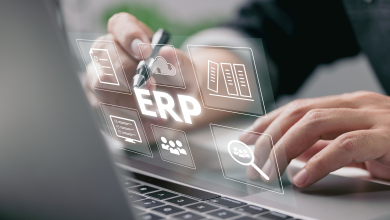When talking about ERP systems, it is usually considered that they are used by large-scale enterprises. And this conclusion is reasonable as in this case, the automation and effective management of the production process make up a mandatory part of the business. But what about the usage of ERP systems for smaller businesses?
Let’s have a look at this issue.
Today, we will tell in detail, what is ERP, how such a system can be used for improving the performance of small businesses, and why its implementation is not an extra measure, but a necessity. Also, we will take a look at the main factors of success of using ERP for small businesses and the indicators of the fact that your ERP system does not contribute to growth.
What is ERP for Small Businesses (SMB)?
An ERP system is a class of systems for managing the process of production, work resources, finances and assets that are focused on optimizing the workflow of a business.

On the modern-day market, there are plenty of ERP options that are created by somewell-known companies for different industries and business spheres. Here are just some examples:
- SAP is one of the ERP market leaders that offers solutions for different business sectors, including finance, logistics, production, trade and others.
- Oracle is another company that offers ERP systems for different spheres and business processes, including personnel management, supply chain management, analytics, and so on.
- Microsoft Dynamics is a whole family of Microsoft ERP systems that integrate with other Microsoft products such as Office 365, Power BI and Azure. Microsoft Dynamics offers solutions for finance, operations, commerce, projects, and more.
However, most of these systems have one significant drawback – they are not suitable for small businesses. Smaller businesses simply don't have the complex requirements of larger ones. They do not need large-scale and, accordingly, expensive systems. Naturally, one can argue here, because the same SAP has a ready-made solution for small and medium-sized businesses – SAP Business One. But whether it is right for you is the question as customization matters!
Small business ERP systems must be:
- easy to set up and use;
- sufficiently functional within the framework of business requirements;
- easy to integrate with other applications and services;
- protected and safe;
- cloud-based and with an easy mobile access.
But the most important thing is that an ERP system must be, in theory, tailored and adapted to the needs of your small or medium-sized business. Ready-made solutions from large vendors can really be way easier to implement and set up.
And even more affordable if we are talking about the subscription payment model. But adapting it for small businesses and setting up flexibly and integrating it with other solutions is way harder. Here, you need a more flexible module system.

Strategic Aims of Using ERP Systems for Small Businesses
Generally speaking, the main strategic objective of any business is to increase its profit. But this description is rather brief. In practice, ERP solutions for small businesses cover several needs and objectives:
- To increase growth and market share by streamlining business processes, improving efficiency and meeting customer needs.
- To increase profitability through reducing expenses, improving the ways the budget is managed, increasing margins and pricing accuracy
- To increase competitiveness through implementing new technology tools, such as mobile access, eCommerce, big data, and AI.
- To modernize business systems through updating software, integrating different modules and data, ensuring security and stability.
- To improve the way clients are served through offering personalized products, services and solutions, improving the brand and customer trust, as well as increasing the quality and speed of delivery.
- To expand the professional possibilities through adding additional sources of income, discovering new markets, developing new products and services.
- To increase flexibility through adapting to constant change in demand, the needs of the target audience, competition, etc.
Eventually, using ERP systems helps businesses grow, become more profitable and competitive, develop, serve client more effectively, discover new ways of growing, and be more flexible.
And also, to automate and optimize its business processes, to get true information, and to make well-thought decisions and adapt to the changing surroundings.

Signs Your ERP System Can't Support Growth
Imagine you already have a cloud-based ERP for small businesses. Generally, it satisfies your demands, but you understand that in the near future, its potential will not be enough for the work to be effective.
How do you know if your system is scalable?
Actually, it's not that difficult. Try to answer a few questions:
- Do you need to manually upload and transfer data between different systems, including between Excel spreadsheets?
- Is decision making slowed down by unreliability or lack of real-time data? Or because of periodic problems with access to them?
- Do you use Excel spreadsheets more than your ERP system?
- Does your ERP system consist of disparate solutions from different vendors with many internal or external integrations?
- Is the number of dissatisfied customers growing?
- Are you experiencing any of the following problems? A sharp increase in the cost of maintaining an ERP system. Lack of support for your current ERP product. The need to update the ERP system in the near future.
The more affirmative answers you have, the more evidence that your current ERP system cannot scale efficiently and actually cannot keep up with business growth. Accordingly, it needs to be changed!

Key ERP Success Factors for SMBs
ERP software for small businesses will only be effective if the business itself knows and understands what kind of ERP system and for what tasks it needs. And it is essential to combine several key factors at once:
- Choosing an ERP system that suits the functionality, cost, and deployment method for a particular business.
- Setting up and configuring an ERP system in accordance with the specifics of business processes, requirements and company goals.
- Integration of the ERP system with other systems such as CRM, eCommerce, self-service portals, business intelligence, etc.
- Training and support for users of the ERP system, increasing their satisfaction and productivity.
- Ensuring the security, reliability and compliance of the ERP system, data protection and access control.
- Monitoring and analysis of the ERP-system, identifying problems, opportunities and improvements.
- Updating and modernizing the ERP system in line with changes in business, technology and competition.
And here we are again returning to what we talked about at the beginning. An ERP system should be tailored specifically to the needs of your business, and not a business should adapt to it. Of course, you can use ready-made solutions, but it is unlikely that you will be able to achieve maximum business efficiency. That is why we emphasize once again: individual modular solutions are better!
- They take into account the specifics, needs and goals of a particular business, and do not offer a "unified" approach.
- They allow you to use and configure only those modules that are necessary for your business, avoiding unnecessary complexity and costs.
- They are easily integrated with other systems – various CRMs, self-service portals, business intelligence tools.
- They quickly adapt to changes in business, technology and competition, providing opportunities for innovation and modernization.
- They eventually allow you to earn more!
And now let's simulate the situation: you are a small business that already uses different enterprise resource management systems and wants to expand. What ERP system will you choose for yourself - a ready-made popular system from a well-known vendor, but with a number of limitations and frankly superfluous functions? Or designed specifically for your goals, objectives and preferences? The choice is yours!
